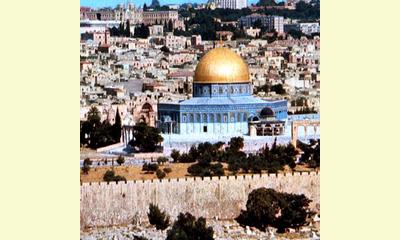|
|
Sharing the right to Jerusalem's past
an article by Yonathan Mizrachi, excerpted from Common Ground News Service
Jerusalem - The Palestinian village Silwan in East Jerusalem is
situated about a hundred metres from the Temple Mount/Haram el Sharif.
It is home to 40,000 Palestinians and almost 400 Jewish settlers. The
village also hosts a large archaeological site called the "City of
David" . . .

The Dome of the Rock in Jerusalem
click on photo to enlarge
Despite
the diversity of cultures and histories in this area, the central story
told to those who visit the City of David excavation site is that
aspect of Jerusalem's history which is meaningful primarily to Jews.
Stories about artefacts found at the site that testify to the existence
of other cultures and religions, some of which are particularly
meaningful to local Palestinian residents are omitted.
Sadly, local Palestinian residents, who have always felt proud
of living in one of the places where Jerusalem first emerged, have been
excluded from the story. This is all the more lamentable considering
that Jerusalem is considered a holy city for all Abrahamic faiths.
In response to this reality, a group of Israeli archaeologists
and social activists established Emek Shaveh, a non-governmental
organisation dedicated to promoting the idea that the past belongs to
everyone - regardless of their religious or national affiliation.
Any archaeological artefact tells a complex story that is
independent of contemporary traditions and beliefs. Listening to the
stories and what they tell us about the history of Jerusalem could
enrich our present-day culture and promote tolerance and pluralism. The
cultural riches of archaeological sites are inseparable from the
cultural wealth of the land and belong to all communities, peoples and
religions who share it. . .
To preserve Jerusalem's heritage, all sides must strive to make
antiquities accessible to everyone and remember that alongside one’s own
heritage there are others that are no less important. Recognising this
is important for the Palestinian residents of Silwan, Israeli society
and anybody who desires a better future for the parties in conflict.
|








|
DISCUSSION
Question(s) related to this article:
How can different faiths work together for understanding and harmony?
Thematic forum(s) in which this article is being discussed:
RELIGION AND PEACE - LA RELIGION ET LA PAIX
Latest reader comment:
Readers' comments are invited on this topic and the six reports to which it refers: Creating Harmony in the World: Working through Our Faiths in Dialogue; Alternate Focus: Balance in Media Coverage in Middle East; The Parliament of the World's Religions (Barcelona, Spain); Asian Religious Leaders Urge Religions To Teach Peace; Living Faiths Together - Tool kit on inter-religious dialogue in youth work; A High Wind of Grace in Jamaica.

|
|
|
This report was posted on April 19, 2011.
If you wish to start a new discussion topic on this article, please copy the title of this article which is Sharing the right to Jerusalem's past and its number which is 458 and enter this information along with your discussion question and an introductory response to the question here.

A few stories are retained on the main listings if they are considered
by readers to be a priority. If you have not already done so, please
take the time to check a box below: should this article be considered as
a priority?

|







